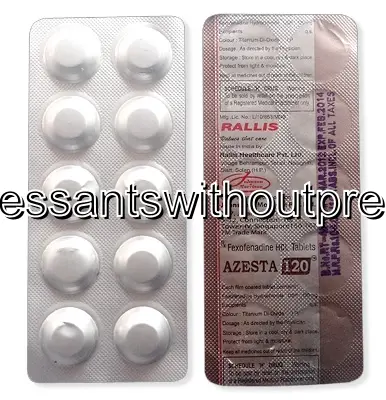| Package | Dosage | Price | Price per Dose | |
|---|---|---|---|---|
| Dosage: 120mg | ||||
| 240 pill | 120mg | £340.14 | £1.42 | |
| 180 pill | 120mg | £259.83 | £1.44 | |
| 120 pill | 120mg | £175.97 | £1.46 | |
| 90 pill | 120mg | £138.17 | £1.54 | |
| 60 pill | 120mg | £96.84 | £1.62 | |
| 30 pill | 120mg | £51.96 | £1.72 | |
| 10 pill | 120mg | £20.07 | £1.98 | |
| Dosage: 180mg | ||||
| 240 pill | 180mg | £388.56 | £1.62 | |
| 180 pill | 180mg | £295.26 | £1.64 | |
| 120 pill | 180mg | £207.86 | £1.74 | |
| 90 pill | 180mg | £164.16 | £1.82 | |
| 60 pill | 180mg | £116.92 | £1.95 | |
| 30 pill | 180mg | £63.77 | £2.11 | |
| 10 pill | 180mg | £22.43 | £2.23 | |

Fexofenadine Description
Introduction to Fexofenadine
Fexofenadine is a widely used medication primarily known for its effectiveness in relieving allergy symptoms. Belonging to the class of second-generation antihistamines, it is designed to reduce the body’s allergic response without causing significant drowsiness. This medication is commonly prescribed for seasonal allergic rhinitis and chronic idiopathic urticaria.
Mechanism of Action
Fexofenadine works by selectively blocking the H1 histamine receptors in the body. When an allergen triggers the immune system, histamine is released and binds to these receptors, leading to symptoms such as sneezing, itching, runny nose, and skin rashes. By inhibiting this binding, fexofenadine diminishes these allergic reactions. Its selective nature means it avoids the sedative side effects often associated with first-generation antihistamines.
Effectiveness and Benefits
Many users report rapid relief from allergy symptoms after taking fexofenadine. It effectively reduces sneezing, nasal congestion, and watery eyes. The medication has a favorable safety profile, making it suitable for long-term use. Patients often choose fexofenadine because it is less sedating, allowing them to continue daily activities without feeling drowsy or impaired. It also provides sustained relief over a 24-hour period with once-daily dosing, enhancing compliance and convenience.
Usage and Dosing
The standard dose for adults and children over 12 years old is typically 60 mg twice daily or 180 mg once daily, depending on the severity of symptoms. It is crucial to follow the healthcare provider’s instructions and not to exceed the recommended dose. Fexofenadine tablets are usually taken with water, and they can be administered with or without food. Consistency in timing helps maintain steady medication levels, ensuring optimal symptom control.
Possible Side Effects and Precautions
While fexofenadine is generally well tolerated, some users may experience side effects. Mild symptoms include headache, nausea, or dizziness. Serious adverse reactions are rare. Patients with allergies to similar medications should exercise caution. It is advisable to inform your doctor about any existing medical conditions or other medications you are taking, as fexofenadine may interact with certain drugs. Pregnant or breastfeeding women should consult their healthcare provider before use.
Conclusion
Fexofenadine is an effective and safe choice for managing allergy symptoms. Its non-sedating profile makes it a preferred option for many seeking relief without impairing their alertness. When used as directed, it can significantly improve quality of life during allergy seasons or in chronic allergy conditions. As always, consulting a healthcare professional ensures proper use and maximizes its therapeutic benefits.
